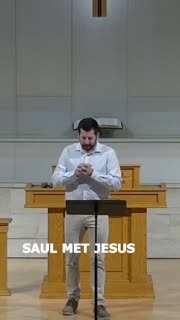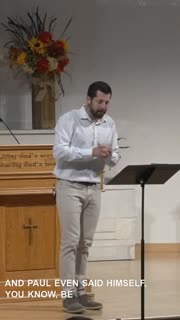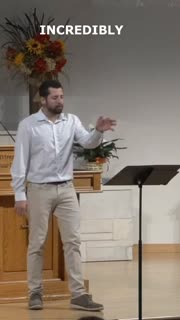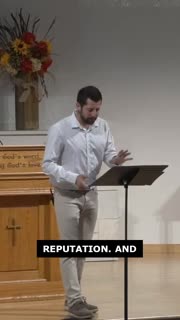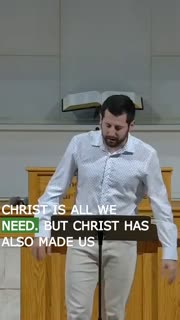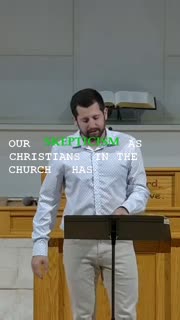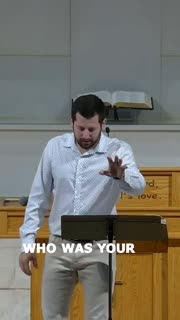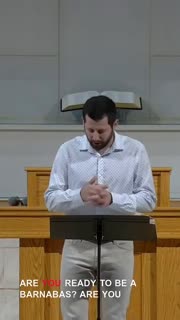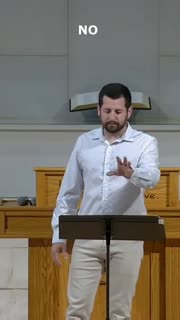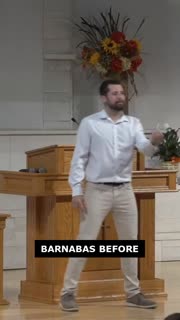Embracing Transformation: The Power of Community in Faith
Devotional
Sermon Summary
Bible Study Guide
Sermon Clips
1. "Saul met Jesus on his way to Damascus as he was going there to hopefully bind and jail Christians. But then on his way there, he found out firsthand that Jesus is alive. It's true. The resurrection is real. And the power that raised Jesus from the dead, the power that Paul got to experience, that day is the same power that is still at work in us. It's transforming us just like it's transforming Paul." [26:20] (33 seconds)
2. "Paul even said himself, You know, be imitators of me as I am of Christ. So we can look up to Paul because Paul's love and devotion to Jesus, but even though we look up to him, we worship Jesus. And that is what we hope becomes even deeper throughout this series, is your love and your devotion to Jesus through this, the one that's at work in Paul, but also the one that's at work in you, in your life." [28:12] (26 seconds)
3. "Paul was incredibly well-trained from his youth, both in memorizing the old scriptures and learning how to debate text. And now he's using that training alongside the power of the Holy Spirit with the knowledge of Christ to prove to the Jews in Damascus that Jesus is the Christ, as it says in verse 22." [31:57] (19 seconds)
4. "Paul had a reputation. And by golly, it wasn't great in the Christian circles. He was zealous against the church. He was a hunter of Christians, as we've talked about many times. And until his conversion, he wanted to single-handedly end this Christian movement. And that reputation made the church awfully skeptical of him." [37:41] (23 seconds)
5. "Christ is all we need. But Christ has also made us to be in community, made us be part of the body, and to be a blessing to it and be blessed by it. And this is where Barnabas comes in the text. This big, but Barnabas took him. See, Paul didn't just have Christ in Jerusalem. He had Christ, and he also had Barnabas. One ally who was trusted in the church, and it took Barnabas' influence and endorsement to let people see Paul as he was. A new man." [39:12] (43 seconds)
6. "Our skepticism as Christians in the church has potential to truly hinder the work of the Lord. See, the early church sees Saul, this new man, and they're just too skeptic. In seminary, sometimes we would call this skeptic acid. I don't know, that was the term. We're infected with this skepticism of like, I know Jesus does great things. I know Jesus does great things. I know Jesus can transform lives. But I don't think he's transforming that life." [41:01] (33 seconds)
7. "Who was your Barnabas? If you've been in the church for a while or you've been walking with the Lord, did you have a Barnabas who walked with you early on, who vouched for you, who welcomed you while you still maybe had that questionable reputation? I feel like we all have a Barnabas, a mom or a dad, a grandma, an uncle, a friend, a mentor that loved us and plugged us into the body of Christ." [43:08] (26 seconds)
8. "Are you ready to be a Barnabas? Are you ready to be one? One like Paul has in his story to welcome new people to God. Welcome new people in the body regardless of their past. And if you're ready to be a Barnabas, just look around because there's a world of people that need to be led, that need to be led into the church through relationships." [45:20] (24 seconds)
9. "No Christian is as strong as they could be or as healthy as they could be spiritually if they are without the church body. And Paul, perhaps one of the most sound Christians ever, depended on the church constantly. We never, ever graduate out of our need for the church. We never mature to a point where fellowship, relationship with other believers and walking in life with other believers just becomes unnecessary." [48:19] (27 seconds)
10. "Christ is our Barnabas before the Heavenly Father. Just as we are called, just as Barnabas comes and connects Paul to fellowship of the church, Christ has come to connect us with the fellowship with the Heavenly Father. He is a mediator. See, Barnabas' act is a Christ-like act in the book of Acts because he comes and he says, regardless of reputation, I am here for you and I'm going to make sure that these relationships get established." [49:24] (31 seconds)
Ask a question about this sermon
2. "Paul even said himself, You know, be imitators of me as I am of Christ. So we can look up to Paul because Paul's love and devotion to Jesus, but even though we look up to him, we worship Jesus. And that is what we hope becomes even deeper throughout this series, is your love and your devotion to Jesus through this, the one that's at work in Paul, but also the one that's at work in you, in your life." [28:12] (26 seconds)
3. "Paul was incredibly well-trained from his youth, both in memorizing the old scriptures and learning how to debate text. And now he's using that training alongside the power of the Holy Spirit with the knowledge of Christ to prove to the Jews in Damascus that Jesus is the Christ, as it says in verse 22." [31:57] (19 seconds)
4. "Paul had a reputation. And by golly, it wasn't great in the Christian circles. He was zealous against the church. He was a hunter of Christians, as we've talked about many times. And until his conversion, he wanted to single-handedly end this Christian movement. And that reputation made the church awfully skeptical of him." [37:41] (23 seconds)
5. "Christ is all we need. But Christ has also made us to be in community, made us be part of the body, and to be a blessing to it and be blessed by it. And this is where Barnabas comes in the text. This big, but Barnabas took him. See, Paul didn't just have Christ in Jerusalem. He had Christ, and he also had Barnabas. One ally who was trusted in the church, and it took Barnabas' influence and endorsement to let people see Paul as he was. A new man." [39:12] (43 seconds)
6. "Our skepticism as Christians in the church has potential to truly hinder the work of the Lord. See, the early church sees Saul, this new man, and they're just too skeptic. In seminary, sometimes we would call this skeptic acid. I don't know, that was the term. We're infected with this skepticism of like, I know Jesus does great things. I know Jesus does great things. I know Jesus can transform lives. But I don't think he's transforming that life." [41:01] (33 seconds)
7. "Who was your Barnabas? If you've been in the church for a while or you've been walking with the Lord, did you have a Barnabas who walked with you early on, who vouched for you, who welcomed you while you still maybe had that questionable reputation? I feel like we all have a Barnabas, a mom or a dad, a grandma, an uncle, a friend, a mentor that loved us and plugged us into the body of Christ." [43:08] (26 seconds)
8. "Are you ready to be a Barnabas? Are you ready to be one? One like Paul has in his story to welcome new people to God. Welcome new people in the body regardless of their past. And if you're ready to be a Barnabas, just look around because there's a world of people that need to be led, that need to be led into the church through relationships." [45:20] (24 seconds)
9. "No Christian is as strong as they could be or as healthy as they could be spiritually if they are without the church body. And Paul, perhaps one of the most sound Christians ever, depended on the church constantly. We never, ever graduate out of our need for the church. We never mature to a point where fellowship, relationship with other believers and walking in life with other believers just becomes unnecessary." [48:19] (27 seconds)
10. "Christ is our Barnabas before the Heavenly Father. Just as we are called, just as Barnabas comes and connects Paul to fellowship of the church, Christ has come to connect us with the fellowship with the Heavenly Father. He is a mediator. See, Barnabas' act is a Christ-like act in the book of Acts because he comes and he says, regardless of reputation, I am here for you and I'm going to make sure that these relationships get established." [49:24] (31 seconds)
